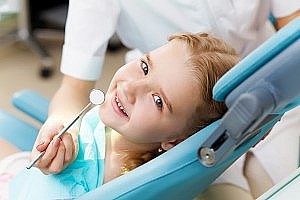What are chalky teeth?

Chalkiness can occur in baby teeth and in adult teeth. A chalky tooth is one where the outer surface of the tooth (called enamel) is whiter than normal or shows discoloured patches or spots. Sometimes the discoloured areas are off-white, yellow or brown. The yellow or brown enamel is usually soft and porous, making the tooth sensitive and prone to breaking down when your child eats.
The technical name for chalky teeth is molar-incisor hypomineralisation. The condition results in teeth that have abnormally low amounts of calcium. Children can have one or many teeth affected. Less commonly, it is possible for a child to have every tooth affected.
How common and how serious is it for children to have chalky teeth?
Research has shown that at least one in six children is affected by chalky teeth. Also, the tooth in question is more prone to developing tooth decay. Many of the affected children will lose their adult molars and will be on a path to years of expensive dentistry and orthodontics.
Why does my child have a chalky tooth/teeth?
The answer is that the tooth or teeth was/were damaged while still developing inside your child’s jaw – most likely by a childhood illness.
Teeth take several months to several years to grow under the gums. During this period of dental development, teeth are at risk of becoming chalky if your child is unwell with a fever. Sometimes, the medications that doctors prescribe for your child’s illness (such as antibiotics) also contribute to hypomineralisation.
However, not every child will develop chalky teeth as a result of being unwell. Genetics may also play a role. Therefore your child is statistically more likely to develop the problem if they have family members (such as a parent or grandparent) who have had chalky teeth.
A child’s diet, dental hygiene and lifestyle is not related to chalky teeth. However, eating well and brushing teeth regularly and thoroughly does improve the prognosis of chalky teeth.
What should I do if I think my child has a chalky tooth?
Sometimes what appears to be chalky white or yellow spots on a tooth are actually the beginning of tooth decay, rather than a developmental problem, so if you think your child might have chalky teeth it is important to see a paediatric dentist for an assessment. They will be able to advise you on how to manage the problem according to your child’s age and dental development.
How does the dentist manage my child’s chalky baby teeth?
Your dentist will always try to restore the affected tooth where possible. Sometimes this will be done using a baby tooth crown. However, if the enamel is severely compromised, the tooth may need to be extracted. If the chalky teeth are sensitive, nerve (pulp) treatment may be needed. Treatment planning is likely to be complex and to involve several dental practitioners – such as orthodontists and prosthodontists.
The Chalky Teeth Campaign
The paediatric dental team at Smile Solutions supports a worldwide initiative called the Chalky Teeth Campaign. Parents can visit the website and learn about chalky teeth and how to recognise them.

